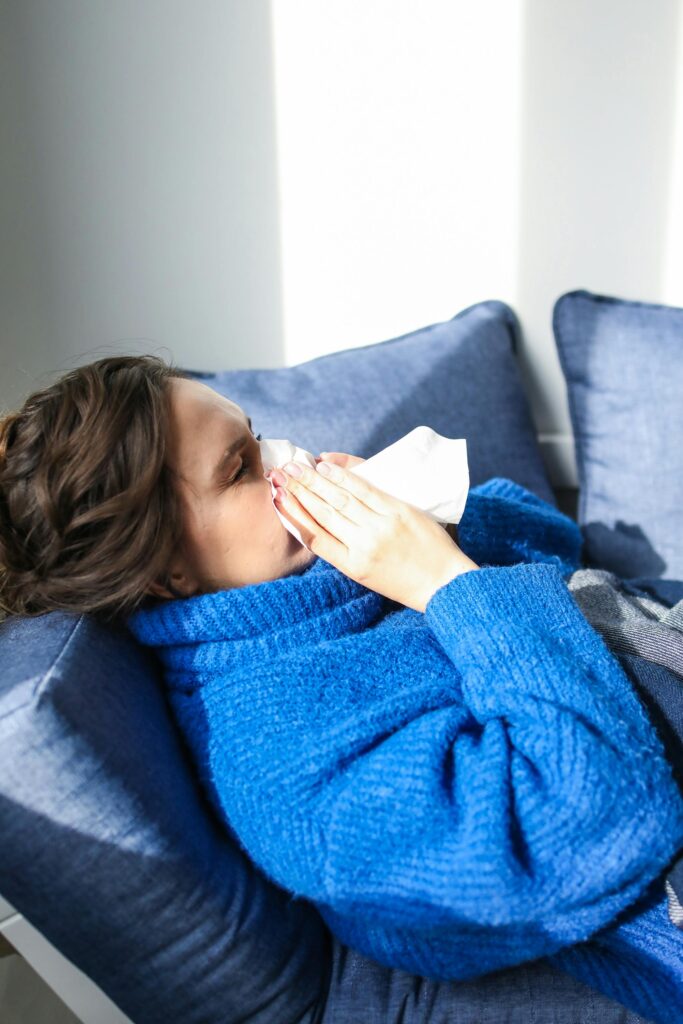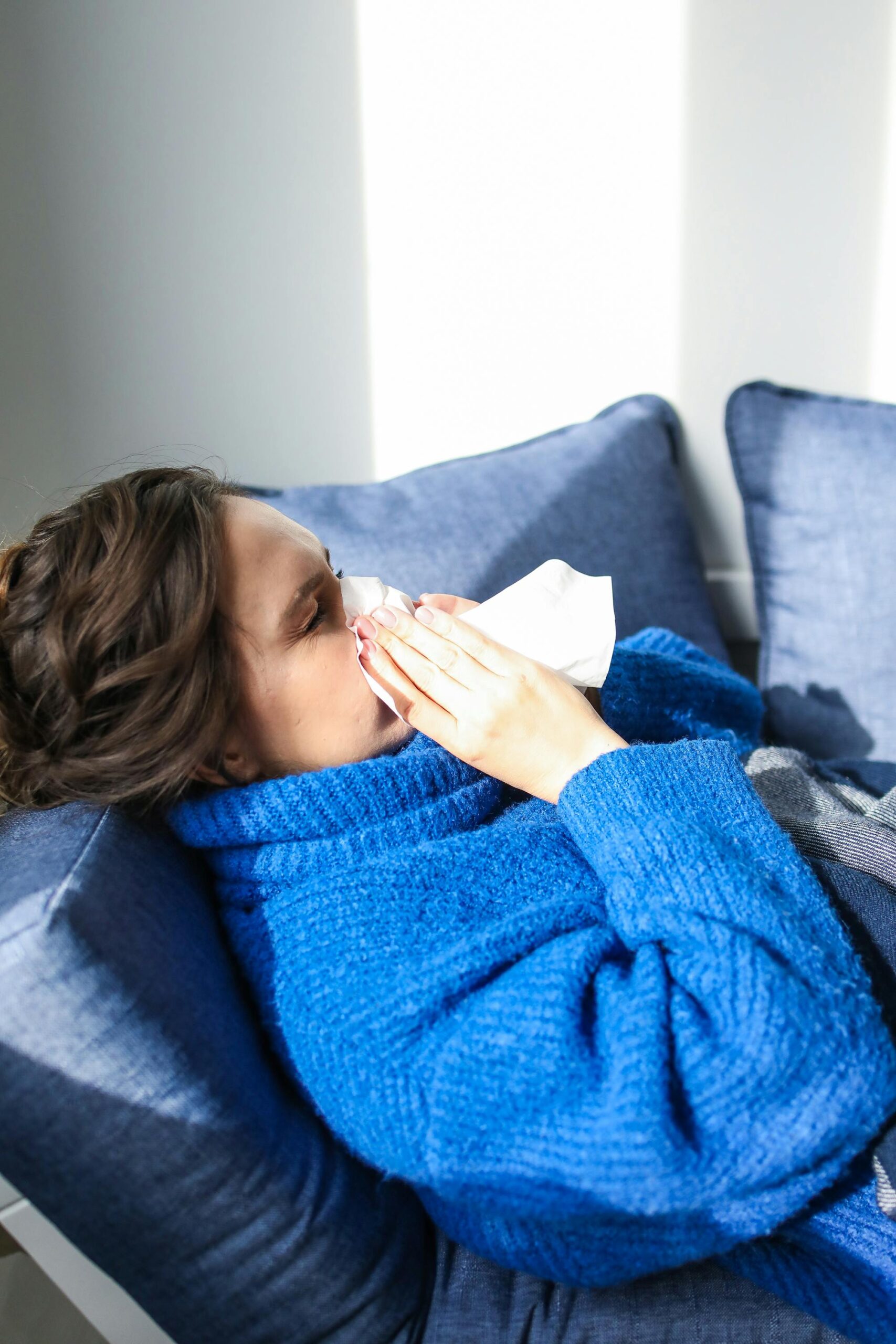Do you find yourself dreading the arrival of spring or fall because of the relentless assault of seasonal allergies? The itchy eyes, runny nose, and constant sneezing can turn even the most pleasant of days into a battle against nature’s elements.
We understand the frustration and discomfort that comes with seasonal allergies all too well.
In this article, we’ll delve into the root causes of seasonal allergies and explore how incorporating targeted nutritional strategies can offer relief, allowing you to fully embrace the joys of each passing season.
What are seasonal allergies?
Seasonal allergies, also known as allergic rhinitis or hay fever, are an allergic reaction triggered by shifts in the environment that affect natural elements such as mold, pollen, grasses, weeds, and similar substances.
While individuals may experience reactivity during specific times of the year, the most prevalent allergies tend to manifest during particular seasons. In the springtime, there’s a surge in tree pollen counts that trigger heightened allergic reactions, while in June and July, grass pollen becomes the predominant allergen. As the seasons transition to fall, ragweed and mold allergens reach their peak. Even in winter some individuals may not find relief, as indoor allergens like dust mites and pet dander persist. For the unfortunate few, multiple allergies can plague them year-round, making symptoms a constant struggle.
Fortunately, there are holistic approaches to managing seasonal allergies that can alleviate symptoms and enhance overall well-being.
Signs and Symptoms of Seasonal Allergies
Most of us are familiar with the symptoms of seasonal allergies, but it is important to note that they can manifest with a variety of signs and symptoms, ranging from mild to severe. The severity and duration of symptoms can vary depending on the individual’s sensitivity to allergens and the specific allergens present in their environment.
Some of the most common symptoms include:
- Runny, itchy nose
- Sneezing
- Itchy and watery eyes
- Hives
- Rashes
- Coughing
- Headache
- Itchy skin
- Wheezing
What causes seasonal allergies?
Allergies occur when the immune system overreacts to a substance that should otherwise be harmless. Since we’re talking about seasonal allergies, the body’s immune system is responding to environmental substances like pollen from grasses, trees, weeds, or mold spores.
When a person with allergic tendencies comes into contact with these allergens, their immune system perceives them as harmful invaders and mounts a defense, leading to the release of various inflammatory substances that trigger allergy symptoms.
Let’s break that down a little more.
Mast cells are immune cells found in the mucous membranes of the respiratory tract. When allergens, like pollen, bind to antibodies on the surface of mast cells, they trigger the release of histamine and other inflammatory chemicals.
Histamine then acts on nearby cells, causing blood vessels to dilate, mucous glands to produce excess mucus, and nerve endings to become more sensitive, leading to symptoms such as sneezing, itching, nasal congestion, and watery eyes. The other inflammatory molecules, like prostaglandins and leukotrienes, further amplify the immune response and contribute to the allergic symptoms.
So why do some people develop seasonal allergies while others don’t? There’s likely some combination of genetic, environmental, and immunological factors that kick the immune system into overdrive.
Physical, Environmental, and Lifestyle Factors that contribute to an overloaded immune response include:
- Histamine Overload: If histamine isn’t efficiently removed from the body via the liver, gut, and lymphatic drainage, histamine levels build up beyond what the body can effectively manage. When histamine levels remain elevated due to excess exposure and/or inefficient clearance, allergic reactions may become more severe and prolonged.
- Gut Microbiome: The gut affects seasonal allergies through its microbiota, immune regulation, barrier function, and production of metabolites. Imbalances in gut bacteria can lead to exaggerated immune responses to allergens, while disruption of the gut barrier allows allergens to enter the bloodstream, triggering allergic reactions. Gut microbes produce metabolites that can influence immune responses, and a lack of microbial diversity is associated with an increased risk of seasonal allergies.
- Environmental Factors: Environmental factors such as air or water pollution, pesticides and food, and exposure to tobacco smoke can exacerbate allergic symptoms by irritating the respiratory tract and compromising immune function. They add to the body’s overall detox burden, taking resources away from metabolizing histamines and restoring gut balance.
- Stress: Psychological stress can influence seasonal allergies by triggering the release of the stress hormone, cortisol, which in turn modulates the immune system and exacerbates the allergic response. Chronic stress may also contribute to inflammation and immune dysregulation, further worsening allergy symptoms.
- Cross-Reactivity: Some allergens share similar protein structures, leading to cross-reactivity. For example, individuals allergic to certain tree pollens may also experience symptoms when exposed to certain fruits or vegetables due to similarities in protein structure between the pollen and the food.
Understanding the root cause of seasonal allergies allows us to implement targeted interventions, such as addressing gut health, histamine tolerance, inflammation, and immune function, which can effectively ease your symptoms and improve your health.
Conventional Vs. Holistic Approaches to Managing Seasonal Allergies
The conventional approach to seasonal allergies typically involves the use of antihistamines, decongestants, corticosteroids, and other pharmaceutical medications to manage symptoms.
Antihistamines work by blocking the action of histamine, reducing sneezing, itching, and nasal congestion. Decongestants help alleviate nasal congestion by narrowing blood vessels in the nasal passages, while corticosteroids reduce inflammation and swelling in the nasal passages, providing relief from symptoms such as nasal congestion and sneezing. In severe cases, allergen immunotherapy (allergy shots) may be recommended to desensitize the immune system to specific allergens over time, reducing the severity of allergic reactions.
While these conventional treatments can provide temporary relief from seasonal allergy symptoms, they often come with side effects like increased heart rate or blood pressure, anxiety, dry mouth, insomnia, constipation, and drowsiness. Plus, they don’t address the underlying immune dysregulation or gut health imbalances that contribute to allergic responses. Therefore, integrating complementary approaches, such as dietary modifications and lifestyle interventions may offer a more comprehensive and sustainable approach to managing your seasonal allergies now, and preventing them in the future.
How Our Patients Reduce Their Seasonal Allergy Symptoms Holistically
A holistic approach, focusing on dietary strategies, lifestyle adjustments, and tailored supplementation can reduce inflammation and ease your body’s overactive immune response, helping you manage, prevent, and treat your seasonal allergies.
Dietary Strategies for Seasonal Allergies
Adopt a Low Histamine Diet
Limiting dietary intake of high-histamine foods and those that stimulate the release of histamines eases the burden on your immune system and can lead to reduced allergy symptoms.
High-histamine and histamine-releasing foods to avoid include:
- Processed foods that contain artificial colors and preservatives
- Cured meats – salami, pepperoni, smoked meats
- Fermented foods – sauerkraut, kimchi, yogurt, kombucha, pickles
- Certain vegetables – mushrooms, spinach, eggplant
- Certain fruits – tomato, plums, pineapple, avocado, citrus, strawberries
- Hard cheeses – parmesan, cheddar, gouda, manchego
- Soy products – tempeh, tofu, miso, soy sauce, soy milk
- Vinegar
- Alcohol
- Olives
- Dried fruits or canned goods
- Chocolate
- Leftovers – since they accumulate histamines due to the natural fermentation and breakdown of proteins over time.
Instead, focus on eating freshly cooked eggs, meat, fish, and poultry and filling up on low-histamine fruits and vegetables like leafy greens, broccoli, carrots, melons, apples, and pears. Fresh herbs, unprocessed grains, and coconut products are additional options to include.
Reduce Inflammatory Foods
One of the fundamental steps in managing seasonal allergies is to reduce the intake of inflammatory foods. These include ultra-processed foods, added sugars, artificial ingredients, and inflammatory seed oils. Alcohol consumption should also be moderated as it can exacerbate inflammation.
Embrace Anti-Inflammatory Foods
Opt for a diet rich in high-fiber fruits like berries and kiwi, colorful vegetables, complex carbohydrates such as sweet potatoes and brown rice, and high-quality proteins to help counteract inflammation. Incorporating specific nutrients such as quercetin, anthocyanins, vitamin C and omega-3 fatty acids can have antihistamine properties and support the immune system. Consider adding the following foods to your diet:
- Quercetin – apples, onions, broccoli, fennel, berries, citrus, green tea
- Anthocyanins – berries, cherries, grapes, red cabbage, red onion
- Vitamin C – bell peppers, broccoli, citrus, strawberries, kiwi
- Omega 3s – salmon, sardines, tuna, flaxseeds, walnuts, hemp seeds
Identify and Eliminate Trigger Foods
Certain foods may act as triggers for allergic reactions or exacerbate existing allergies. Additionally, individuals with seasonal allergies may experience cross-reactivity between certain foods and common inhalant allergens like pollen. Identifying and eliminating these trigger foods, based on individual sensitivities, can help alleviate symptoms. Common cross-reactions between certain inhalant allergens and specific foods include:
- Birch pollen: apples, pears, cherries, apricots, peaches, carrots, celery, almonds
- Ragweed pollen: melons, bananas, cucumbers, zucchinis, sunflower seeds
- Grass pollen: tomatoes, potatoes, melons, oranges, peaches, celery
- Mugwort – sage, parsley, coriander, oregano, basil, anise, fennel
- Grass pollen – wheat, barley, rye
It’s important to note that cross-reactions vary and not everyone with seasonal allergies will experience these associations. Rather than immediately eliminating them, notice your symptoms when you do consume them and make an informed decision about whether or not your body can handle the load at that moment.
Gut Health Optimization
There’s a well-known link between gut health and immune function that can contribute to a heightened allergic response. A “leaky gut” or intestinal permeability is often implicated in immune-related diseases, including seasonal allergies. Assessing and restoring the gut microbiome with gut-healing nutrients like L-glutamine, zinc carnosine, aloe vera, prebiotic rich foods, and targeted probiotics can support immune regulation and reduce the severity of allergy symptoms. We may run a comprehensive gut test like the GI Map to determine what’s going on in your gut so we can create a tailored approach to kickstart your healing.
Histamine Management
If histamine overload is contributing to your allergy symptoms, reducing histamine-rich foods in the diet can be helpful while we work on supporting histamine detox. Histamine-rich foods to avoid include:
- Fermented foods like sauerkraut, kimchi, tempeh, miso, yogurt, kefir
- Hard cheeses like parmesan, cheddar, blue cheese
- Cured, processed or aged meats
- Smoked fish
- Avocados, tomatoes, pineapples, strawberries
- Spinach, eggplant, mushrooms
- Vinegar-containing foods such as pickles, mustard, certain salad dressings.
Lifestyle Modifications
Reduce Toxin Exposure
Do your best to minimize exposure to environmental toxins and pollutants since they can exacerbate allergy symptoms. Get in the habit of removing your shoes outside or at the front door and showering when you get home for the day to help keep environmental allergens out of your home. Pollen counts tend to rise during the morning and peak midday, so it may be wise to plan your outdoor time accordingly. You can also check the current pollen count in your area at pollen.com. Detoxing your home from common allergens or toxins can help reduce your overall body burden.
Sinus Rinse
Nasal irrigation with a saline solution using a Neti Pot can help clear allergens, mucus, and irritants from the nasal passages, providing relief from congestion and sinus pressure. Taking steamy showers is another way to relieve nasal congestion. Adding a few drops of essential oils like eucalyptus or mint can add natural antimicrobial and mucus thinning effects.
Air Quality Improvement
Investing in an air filter for both home and office environments can reduce exposure to airborne allergens such as pollen, dust mites, and pet dander. We recommend the Air Doctor Pro if you’re looking for a high quality air filter. Regular cleaning and maintenance of HVAC systems can also contribute to better indoor air quality. During peak allergen seasons, keeping windows and doors closed can help keep your air clean.
Personal and Home Hygiene
Practicing good personal hygiene, including frequent handwashing, bathing, and good oral hygiene can prevent the transfer of allergens from hands to face. Keeping your living environment clean and free of dust, mold, and pet dander can help reduce exposure to indoor allergens that may exacerbate your allergy symptoms. Regular vacuuming, dusting, washing bedding in hot water, and minimizing clutter can reduce allergen buildup.
Stress Management
Chronic stress can weaken the immune system and exacerbate allergy symptoms. Practice stress-reducing techniques such as mindfulness meditation, yoga, deep breathing exercises, or spending time in nature to promote relaxation and resilience.
Regular Exercise
We can’t miss out on an opportunity to talk about the benefits of exercise. Engaging in regular physical activity is a great way to support your immune system. Choose activities that you enjoy and that are appropriate for your fitness level, such as walking, lifting weights, swimming, yoga, or cycling. If you’re struggling to exercise outdoors due to seasonal allergies, consider home workouts, joining a gym or another fitness studio.
Supplements That Help With Seasonal Allergies
Supplements can be incredibly powerful tools for those suffering from seasonal allergies. Some to consider include the following:
Quercetin: A flavonoid with antioxidant and anti-inflammatory properties, quercetin helps stabilize mast cells and inhibit histamine release, reducing allergic symptoms. Increasing whole food sources of quercetin is a great place to start, but if you’d like to try a supplemental form, we recommend Natural D-Hist by Ortho Molecular.
Nettles: Nettle leaf extract has been traditionally used to alleviate allergy symptoms due to its anti-inflammatory and antihistamine effects. Supplemental doses of 300-600 mg daily have been shown to ease allergy symptoms, or some people opt for daily nettle leaf teas and infusions.
Diamine Oxidase (DAO) Enzyme: DAO supplements may be beneficial for individuals with histamine intolerance by aiding in the breakdown of histamine in the digestive tract. We recommend Histamine Digest by Seeking Health.
Vitamin C: As a potent antioxidant, vitamin C can help mitigate allergic responses and support immune function. We love Seeking Health liposomal vitamin C.
N-Acetylcysteine (NAC): NAC not only helps promote glutathione production, which plays a crucial role in reducing oxidative stress and inflammation associated with allergies, it also has its own antioxidant and mucus thinning properties.
Boswellia: Also known as Indian frankincense, boswellia extract possesses anti-inflammatory properties that alleviate allergic inflammation and respiratory symptoms.
Ginger: Ginger root contains compounds with anti-inflammatory and immune-modulating effects, potentially reducing allergic reactions and supporting respiratory health. Adding whole ginger root to tea and meals is great for the immune system and gut health. It can also be taken in capsule or tincture forms.
You can sign up and purchase supplements directly from our online pharmacy called Fullscript, here.
Final Thoughts
Understanding how your body responds to different seasons and environmental triggers empowers you to take control of your health. By implementing targeted nutritional interventions, alongside other holistic approaches, you can minimize the impact of seasonal allergies and reclaim your enjoyment of every season.
Embrace the beauty of each season, knowing that with the right support, you can thrive year-round.









